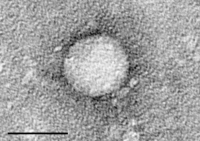
Photo from wikipedia
Japan has the best treatment outcomes for hepatocellular carcinoma (HCC) worldwide [1, 2]. The 20th Nationwide Follow-Up Survey of Primary Liver Cancer in Japan reported a median survival time of… Click to show full abstract
Japan has the best treatment outcomes for hepatocellular carcinoma (HCC) worldwide [1, 2]. The 20th Nationwide Follow-Up Survey of Primary Liver Cancer in Japan reported a median survival time of 61 months, a 5-year survival rate of 50.4%, and a 10-year survival rate of 24% among 65,711 patients with HCC whose data were compiled from approximately 600 institutions across Japan between 2002 and 2009 [3]. The survey included patients of all stages, ranging from single very-early-stage HCC of 2 cm or smaller, to advanced-stage HCC with vascular invasion or extrahepatic spread, to terminal-stage Child-Pugh C HCC. Establishment of a nationwide surveillance system of patients at a high risk of progressing from hepatitis Cor B-related cirrhosis to HCC in Japan has enabled HCC to be detected at an early stage (≤3 tumors of ≤3 cm each, or a single tumor ≤5 cm) in more than 60% of patients, most of whom undergo potentially curative treatment such as resection or ablation. About 30% of patients whose HCC is detected at an intermediate stage undergo transarterial chemoembolization (TACE). The remaining 10% of patients have advanced HCC with vascular invasion or extrahepatic spread or terminal-stage disease with Child-Pugh C liver function at the time of diagnosis. Received: April 3, 2020 Accepted: April 16, 2020 Published online: June 29, 2020
Journal Title: Liver Cancer
Year Published: 2020
Link to full text (if available)
Share on Social Media: Sign Up to like & get
recommendations!